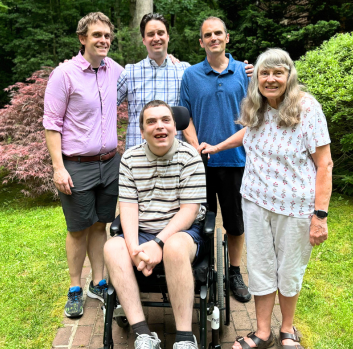By Cindy Adams
Barbara Jacobik and her six-year-old son, Chris, were curled up reading a book when she noticed his chin trembling. "Are you cold?" she asked. He was not cold. Instead, he was experiencing the first symptoms of what was later diagnosed as a rare, inherited form of myoclonic epilepsy known as Unverricht-Lundborg disease. It results in almost continuous seizures. The most difficult word in the neurologist’s explanation was "progressive."
Over the next several years, this Little League baseball star, tennis player, swimmer and diver saw his skills slowly diminish and his mobility dramatically decline. Chris was a popular child who received countless birthday invitations during early elementary years, but all of that slipped away as his disabilities increased.
"He was such a friendly little boy," his mom said. "To see his friends abandon him or even bully him was hard. Really hard."
Too many falls, stitches, broken bones and teeth led Chris to a wheelchair by the age of 16. The seizure disorder created multiple issues, causing him to be in and out of hospitals and a nursing facility for years. He is now 31 years old and lives at enCircle’s Blue Topaz Group Home in Fairfax.
"I probably visited 20 houses with a tape measure in hand," Barbara said. "True wheelchair accessibility is hard to find, but Blue Topaz is the right set-up. The staff is good to him, and he gets along well with his other two housemates. Being there has helped him developmentally."
Ishmael Koroma is the House Supervisor and knows Chris well. He has recently been encouraging Chris to return to physical therapy to help restore his mobility. Unfortunately, Chris sprained his ankle prior to a previous session and, even after the ankle healed, he was hesitant to return. Ishmael, however, knows the trick with Chris. Food!
"It’s the incentive that works every time," Ishmael said. "He’ll go anywhere if there is food involved. His favorite is Red Lobster, followed by Olive Garden, Silver Diner, Taco Bell and any other fast food restaurant."
Chris’s mom agrees that returning to physical therapy includes garlic biscuits and pasta. Their shared goal is for him to remain as functional as possible while research progresses.
"For Christmas, all he wanted was to walk again," Barbara said. "I can’t give him that, but I can help him understand that doing this work is necessary for that future possibility."
Barbara is at Blue Topaz almost daily to take Chris on a walk, watch movies or sports, or play Go-Fish and UNO. He can no longer hold the cards, so she bought him slotted blocks. Outside, she pitches him a tennis ball, and she takes him to the baseball complex where he used to play.
"He would stay there all day and watch the older kids play if I would let him,” Barbara said. “He wants to have a girlfriend. He wants to have a job. He wants to have his own wife and kids as his brothers do."
While Chris can no longer read, he remembers what he has learned about things he enjoys, like country music songs and artists, movies from his mom’s collection, and trips that he has taken. And while the continual seizures destroy brain cells, his thinking capabilities are sometimes impressive. His mom put a bird feeder outside his window, and he has learned the names of many of the visiting birds.
Recently, the Blue Topaz residents took a day trip to Virginia Beach. For the staff and Chris’s mom, his consistent smile was the highlight. For Chris, it was, of course, the food. Nothing like a crab cake at the ocean. Barbara and Ishmael do everything they can to keep Chris happy, engaged and inspired because what he does in the present will most certainly affect opportunities in his future. For this, they are his faithful motivators.
And they call in Red Lobster as needed.


